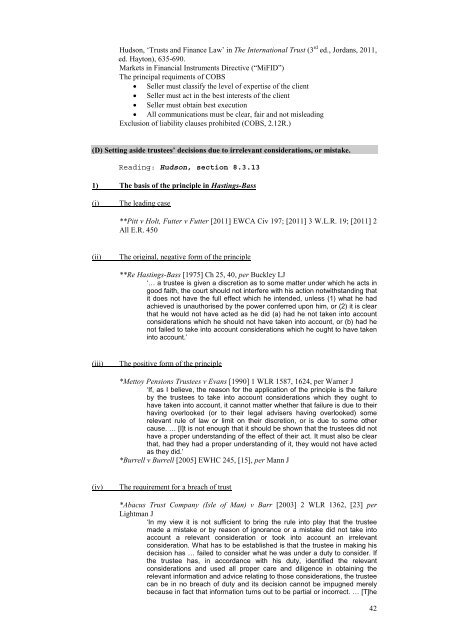Soton Equity and Trusts - alastairhudson.com
Soton Equity and Trusts - alastairhudson.com
Soton Equity and Trusts - alastairhudson.com
You also want an ePaper? Increase the reach of your titles
YUMPU automatically turns print PDFs into web optimized ePapers that Google loves.
Hudson, ‘<strong>Trusts</strong> <strong>and</strong> Finance Law’ in The International Trust (3 rd ed., Jordans, 2011,<br />
ed. Hayton), 635-690.<br />
Markets in Financial Instruments Directive (“MiFID”)<br />
The principal requiments of COBS<br />
Seller must classify the level of expertise of the client<br />
Seller must act in the best interests of the client<br />
Seller must obtain best execution<br />
All <strong>com</strong>munications must be clear, fair <strong>and</strong> not misleading<br />
Exclusion of liability clauses prohibited (COBS, 2.12R.)<br />
(D) Setting aside trustees’ decisions due to irrelevant considerations, or mistake.<br />
Reading: Hudson, section 8.3.13<br />
1) The basis of the principle in Hastings-Bass<br />
(i)<br />
The leading case<br />
**Pitt v Holt, Futter v Futter [2011] EWCA Civ 197; [2011] 3 W.L.R. 19; [2011] 2<br />
All E.R. 450<br />
(ii)<br />
The original, negative form of the principle<br />
**Re Hastings-Bass [1975] Ch 25, 40, per Buckley LJ<br />
‘… a trustee is given a discretion as to some matter under which he acts in<br />
good faith, the court should not interfere with his action notwithst<strong>and</strong>ing that<br />
it does not have the full effect which he intended, unless (1) what he had<br />
achieved is unauthorised by the power conferred upon him, or (2) it is clear<br />
that he would not have acted as he did (a) had he not taken into account<br />
considerations which he should not have taken into account, or (b) had he<br />
not failed to take into account considerations which he ought to have taken<br />
into account.’<br />
(iii)<br />
The positive form of the principle<br />
*Mettoy Pensions Trustees v Evans [1990] 1 WLR 1587, 1624, per Warner J<br />
‘If, as I believe, the reason for the application of the principle is the failure<br />
by the trustees to take into account considerations which they ought to<br />
have taken into account, it cannot matter whether that failure is due to their<br />
having overlooked (or to their legal advisers having overlooked) some<br />
relevant rule of law or limit on their discretion, or is due to some other<br />
cause. … [I]t is not enough that it should be shown that the trustees did not<br />
have a proper underst<strong>and</strong>ing of the effect of their act. It must also be clear<br />
that, had they had a proper underst<strong>and</strong>ing of it, they would not have acted<br />
as they did.’<br />
*Burrell v Burrell [2005] EWHC 245, [15], per Mann J<br />
(iv)<br />
The requirement for a breach of trust<br />
*Abacus Trust Company (Isle of Man) v Barr [2003] 2 WLR 1362, [23] per<br />
Lightman J<br />
‘In my view it is not sufficient to bring the rule into play that the trustee<br />
made a mistake or by reason of ignorance or a mistake did not take into<br />
account a relevant consideration or took into account an irrelevant<br />
consideration. What has to be established is that the trustee in making his<br />
decision has … failed to consider what he was under a duty to consider. If<br />
the trustee has, in accordance with his duty, identified the relevant<br />
considerations <strong>and</strong> used all proper care <strong>and</strong> diligence in obtaining the<br />
relevant information <strong>and</strong> advice relating to those considerations, the trustee<br />
can be in no breach of duty <strong>and</strong> its decision cannot be impugned merely<br />
because in fact that information turns out to be partial or incorrect. … [T]he<br />
42













